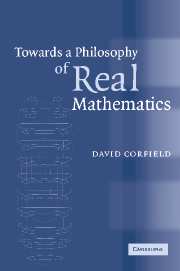Book contents
- Frontmatter
- Contents
- Preface
- 1 Introduction: a role for history
- PART I HUMAN AND ARTIFICIAL MATHEMATICIANS
- PART II PLAUSIBILITY, UNCERTAINTY AND PROBABILITY
- 5 Bayesianism in mathematics
- 6 Uncertainty in mathematics and science
- PART III THE GROWTH OF MATHEMATICS
- PART IV THE INTERPRETATION OF MATHEMATICS
- Appendix
- Bibliography
- Index
6 - Uncertainty in mathematics and science
Published online by Cambridge University Press: 22 September 2009
- Frontmatter
- Contents
- Preface
- 1 Introduction: a role for history
- PART I HUMAN AND ARTIFICIAL MATHEMATICIANS
- PART II PLAUSIBILITY, UNCERTAINTY AND PROBABILITY
- 5 Bayesianism in mathematics
- 6 Uncertainty in mathematics and science
- PART III THE GROWTH OF MATHEMATICS
- PART IV THE INTERPRETATION OF MATHEMATICS
- Appendix
- Bibliography
- Index
Summary
nothing is evidence except in relation to some definite question.
(Collingwood 1999: 37)INTRODUCTION
We have seen in chapter 5 that to model plausible mathematical reasoning in Bayesian terms it is best to forgo logical omniscience. Now, the Bayesian philosopher of science might be quite happy to do so in purely mathematical contexts, while at the same time maintaining that omniscience is not an overly inaccurate assumption for what concerns her – the treatment of confirmation in the natural sciences. Indeed, she might argue that with so much uncertainty surrounding the empirical adequacy of our models, it would be fastidious to worry about our mathematical imperfections. If you put ten male rabbits into a pen with ten female rabbits and come back a few weeks later expecting there to be twenty rabbits but count twenty-five, then you do not question your arithmetic beliefs, but rather your counting and then your model of the stability of the number of rabbits over time. But might this idealisation make us miss something about scientific reasoning itself, especially when our mathematics is not secure? After all, some pieces of physics we trust more than we do some pieces of mathematics. Think of having made a conjecture in combinatorics which you have verified on paper in a few simple cases. You set your computer algebra system onto the problem, and it duly carries out several more calculations which provide confirmation for your conjecture.
- Type
- Chapter
- Information
- Towards a Philosophy of Real Mathematics , pp. 130 - 148Publisher: Cambridge University PressPrint publication year: 2003



